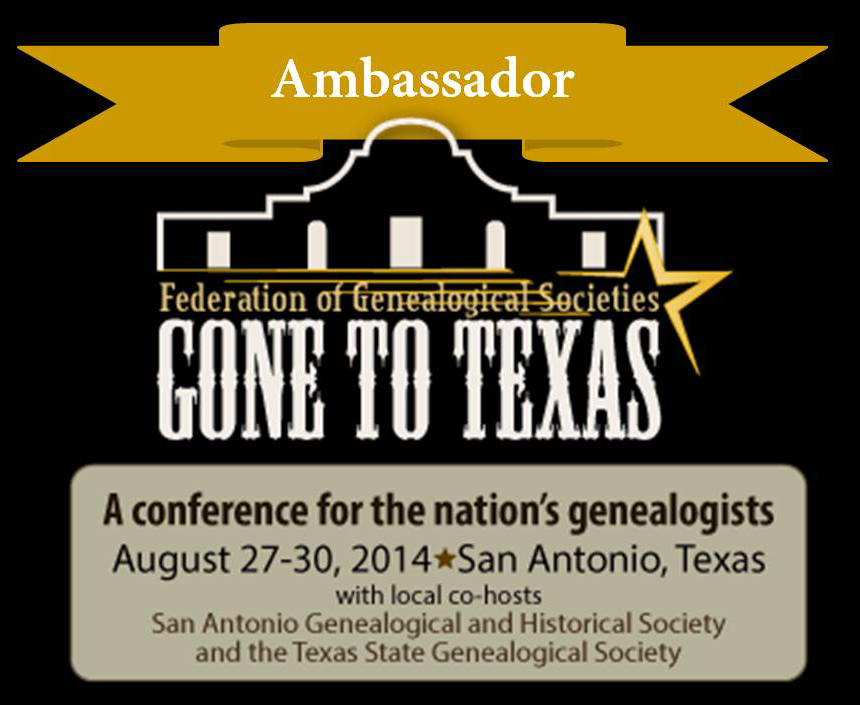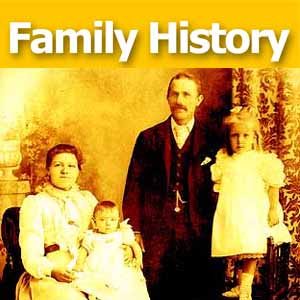Blog


Want to be an FGS Conference Ambassador? Here’s Your Invitation!
 Genealogy bloggers, societies, writers and editors are invited to become FGS 2014 Ambassadors. Ambassadors help to spread information about the FGS Conference in San Antonio, Texas, August 27-30, 2014, through social media to their friends, colleagues, and everyone interested in genealogy.
Genealogy bloggers, societies, writers and editors are invited to become FGS 2014 Ambassadors. Ambassadors help to spread information about the FGS Conference in San Antonio, Texas, August 27-30, 2014, through social media to their friends, colleagues, and everyone interested in genealogy.
FGS 2014 Ambassadors will be:
§ Writing about the conference on their blog.
§ Using the hashtag #FGS2014 on Twitter.
§ Mentioning FGS 2014 on Facebook, Google Plus, and other social networks.
§ Letting their local historical and genealogical societies know about the conference.
Benefits to FGS 2014 Ambassadors:
§ Ambassador badge logo to display on your website.
§ Giveaways for active ambassadors, including conference registrations and discounts, special event tickets, and more.
§ Potential to be guest blogger on FGS Conference Blog.
§ Link to your blog or website on the FGS Conference blog’s Ambassador Page
§ Part of Twitter list of FGS 2014 Ambassadors.
§ Ambassador badge ribbon at the conference.
Click here to register as an FGS 2014 Ambassador and to find the FGS 2014 Ambassador badge to add to your blog or other social media account. Lisa will see you in San Antonio in August! Be sure to circle her classes on your schedule and stop by and say “hi” at her booth in the exhibit hall.

Genealogy Conferences: Live v. Virtual – Which is For You?
 Genealogy conferences offer fabulous education for family historians in a fun, social setting. But some people can’t travel or even clear a full day’s schedule to attend a live conference. Did you know there are virtual options?
Genealogy conferences offer fabulous education for family historians in a fun, social setting. But some people can’t travel or even clear a full day’s schedule to attend a live conference. Did you know there are virtual options?
Check out this video interview from RootsTech 2014 with Allison Dolan, publisher of Family Tree Magazine. We talk about the advantages of attending live events (interacting with expert speakers! social time with others who love genealogy! industry buzz!) versus the attend-in-your-pajamas vibe of Family Tree University’s semi-annual Virtual Conference (click to learn about upcoming events.

Family History Episode 32 – Organize Your Genealogy Files, Part 1
 Family History: Genealogy Made Easy
Family History: Genealogy Made Easy
with Lisa Louise Cooke
Republished May 20, 2014
[display_podcast]
Download the Show Notes for this Episode
Welcome to this step-by-step series for beginning genealogists—and more experienced ones who want to brush up or learn something new. I first ran this series in 2008-09. So many people have asked about it, I’m bringing it back in weekly segments.
Episode 32: Organize Your Genealogy Files, Part 1
Hard drive organization is one of the great challenges that quickly faces new genealogists—and often continues to plague experienced researchers. In today’s episode I’m going to share a system I’ve developed for organizing your computer hard drive files so that you can quickly and easily locate any document. I’ve been using this system for almost a decade and it’s never failed me. So set down your family tree, just for a little while, and put on your apron as we get ready to do some hard drive spring cleaning and organization!
Self-discipline and organization for the genealogist can be our greatest challenge. But it can lead to our greatest research victories!
Think about it. Your amazing research finds become pretty useless if you can’t locate it whenever you need it. And in fact, it has the potential to become a HUGE time and money waster because when you do need it again, you’re going to have to retrace your tracks, find it again at the original source, and pay whatever additional costs that requires.
So each time you’re tempted to toss that record in a pile on your desk or in some non-descript catch all folder on your computer’s hard drive because you’re in a hurry, just remember that in the long run it’s going to slow you WAY down when you want to retrieve it, and ultimately it’s going to dramatically hinder your overall research.
In these next few episodes I’m going to share the hard drive organization system I’ve created for use in Windows. My goal with this system is that I can locate the corresponding electronic file on my computer for any fact in my database in seconds.
Getting Started
At your computer open Windows Explorer. Now on most computers the C drive is the main drive that you store your files on. But if not just double click on the drive where you want to store your computer files.
Select the C drive by clicking on it and go up to the menu and select FILE – NEW FOLDER. In most versions of Windows, you can also just right click on the C drive and select NEW – FOLDER. You’ll see that the label for the folder will be highlighted so that you can name it – so just type GENEALOGY and press ENTER and you will now have a folder on your C drive called Genealogy. Everything’s going to go into this folder.
Overview of Computer Folders:
Setting up folders on your computer is a lot like setting up a filing system in your office. Think of the Genealogy Folder that we just created as a larger drawer in your desk. In that drawer you would put folders for all the major headings of work that you do. And each of these hanging files have a lot of folders in them with sub headings. And within each of these file folders you could even have more folders.
Well, your computer hard drive can be organized much the same way. And you can create all the folders you want.
There are general items having to do with your genealogy research such as:
- Charts and files
- Forms
- History topics
- Research trip materials
- General timelines
- Genealogy societies or organizations
- and other things that don’t pertain to a particular family in your family tree.
But the folders I want to focus in on are the ones that do apply to your family lines. So we’re going to create a folder inside the Genealogy folder called SURNAMES RESEARCHING. How to Create the SURNAMES RESEARCHING Folder:
- Click on the GENEALOGY folder to select it
- Go to the Menu and click on FILE
- Select NEW
- Select FOLDER
- Name the folder
In next week’s episode I’m going to focus on organizing my family tree which will take us into the heart of this system.




